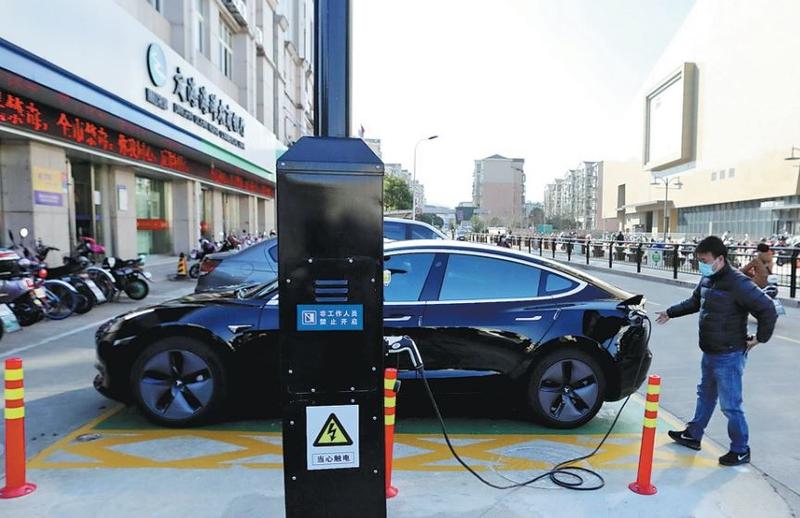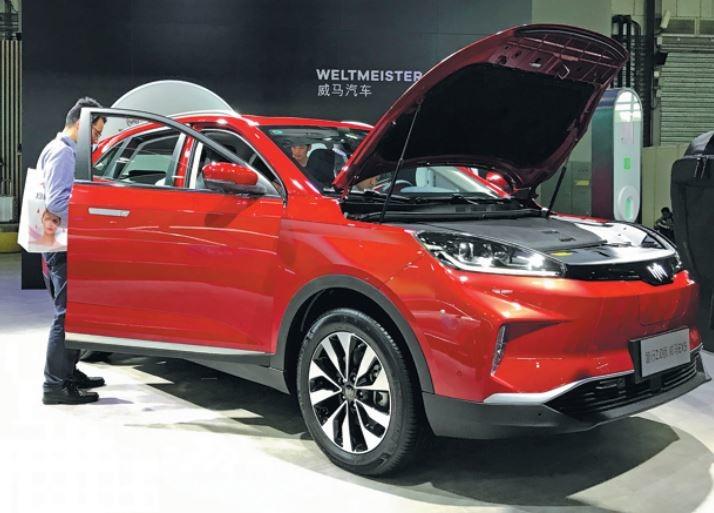 A driver charges his car at a parking lot in Zhoushan, Zhejiang province. (YAO FENG / CHINA DAILY)
A driver charges his car at a parking lot in Zhoushan, Zhejiang province. (YAO FENG / CHINA DAILY)
China is calling for more efforts to build charging poles for electric vehicles, which are expected to alleviate concern about mileage capacity and boost the country's new energy vehicle market that has shown signs of a slowdown.
China had 1.24 million charging poles, both private and public, by the end of January 2020, according to the country's charging infrastructure promotion alliance
At a meeting last week, the country's top officials said that China will step up efforts to push forward a new infrastructure campaign. The campaign covers seven fields including 5G, artificial intelligence and charging poles.
China had 1.24 million charging poles, both private and public, by the end of January 2020, according to the country's charging infrastructure promotion alliance.
ALSO READ: Smart vehicle strategy set to put China strides ahead
That was up 45.8 percent compared to a year ago, but it still lagged far behind the number of new energy vehicles.
Last year, sales of new energy vehicles totaled 1.21 million, down 4 percent year-on-year, according to statistics from the China Association of Automobile Manufacturers.
Despite the first dip in a decade, that brought the total number of electric cars and plug-in hybrids on the country's roads to 3.85 million, which means that three vehicles has only one pole for their use.
According to 2015 guidelines from the National Development and Reform Commission, China is expected to ensure that every new energy vehicle will have a pole by the end of 2020.
Thomas Fang, a partner of consulting firm Roland Berger's China office, who focuses on the automotive industry, said "Setting charging facilities as a priority will bolster the charging infrastructure market and sales of new energy vehicles in the country."
Fang warned that the country's charging pole builders and operators, ranging from power suppliers to carmakers, should be well-coordinated to ensure they play their roles in a constructive way.
China once had hundreds of such companies, but many failed to profit as authorities focused on electric vehicles.
By the end of 2018, only 15 companies operated more than 1,000 charging poles, according to Leqing, a Chinese think tank.
The year 2019 saw some changes for the better. By the end of last December, the number of companies operating 1,000 charging poles grew to 22, and the top 5 accounted for more than 80 percent of the total.
 WM Motor displays a new vehicle at CES Asia in June 2019. (LI FUSHENG / CHINA DAILY)
WM Motor displays a new vehicle at CES Asia in June 2019. (LI FUSHENG / CHINA DAILY)
About 180,000 public charging poles were built across the country last year, bringing the total to 516,000.
Xiang Ji, a senior executive at Star Charge, the country's No 2 charging infrastructure operator, told website D1EV that one reason for the growth in number of poles involved the rising number of electric vehicles on the country's roads and the increase in the number of new models in the market.
Some 60 cities including Shenzhen in Guangdong province and Beijing are introducing electric vehicles into their taxi fleets. China's ride-hailing company Didi Chuxing has around 600,000 electric vehicles registered at its platform.
Taxi drivers and ride-sharing service providers are charging pole operators' largest group of customers, not private car owners that can charge vehicles in their garages.
Xiang said the authorities' shift of subsidies from purchasing electric vehicles to building charging infrastructure in 2019 has bolstered confidence as well. Last week, Tgood, China's largest charging pole operator, announced it finished financing up to 1.35 billion yuan to be spent on research and development.
Headquartered in Qingdao, Shandong province, the company runs over 260,000 public charging terminals.
Roland Berger said the charging facilities will continue to grow. The company estimated that the number of public and private charging poles in China would reach 7 million by the end of 2023.
Analysts say the improved charging network will help boost China's new energy vehicle market as authorities are expected to stop subsidies on electric car sales by the end of this year.
Following the first annual dip in 2019, China's new energy vehicle market is falling sharply in the first two months this year.
But experts blame the slowdown primarily on the ongoing coronavirus outbreak.
The country's largest new energy vehicle maker, BYD, sold 9,936 electric cars and plug-in hybrids in the first two months, down 77 percent from the same period last year.
READ MORE: Chinese electric car startup Nio announces US$100m in financing deals
But analysts said the situation will take a turn for the better when the epidemic is curbed.
Fang at Roland Berger said China's new energy vehicle market will continue to keep a decent growth rate as global carmakers speed up their transition toward electrification.
"By 2025, sales of new energy vehicles will account for 20 percent of the country's total new car sales," he said.


